Sightseeing Uptown complex
On our city sightseeing agenda the Olympic tower but guess what, it was absolutely pouring, no one inclined to get off the bus and get wet including me! Close by the O2 telecommunications firm corporate offices, 146-meters high, the signature tower of the Uptown complex and Bavaria’s tallest building.
BMW Building and Museum
Almost opposite the Olympic Tower, the impressive BMW building and Museum. It was actually completed in 1972 so it’s not new but remains impressive.The building is 101-meters high, the design interesting as it represent the shape of four cylinders in a car engine, the shape of the museum-a cylinder head, both designs very appropriate to the business of the company as a car maker.
Sightseeing in Munich is very historical, buildings dating from 16th century on, and all things Bavarian. Not a lot of time in Munich but a sightseeing tour by bus tour covered a lot of ground; time to explore later on foot and hopefully the rain will stop. Munich is the Bavarian capital city.
Commemorative Gate – Bavarian Army
Munich’s Siegestor (Victory Gate) sits at the terminus of Ludwigstrasse, originally built to commemorate the bravery of the Bavarian army in the Napoleanic War of liberation. The Siegestor is a three-arched triumphal arch crowned with a statue of Bavaria with a lion quadriga. The lion is the heraldic symbol of the House of Wittelsbach, the ruling family of the Bavarian monarchy. The Siegestor damaged in World War II, now repaired and today stands as a monument to peace, with a new inscription “Dedicated to victory, destroyed by war, urging peace”
The Feldherrnhalle (Field Marshall’s Hall) built 1841-44, commissioned by King Ludwig I, to honor the Bavarian Army and its Generals. The design modelled on the “Loggia dei Lanzi” in Florence. The Feldherrnhalle stands at the southern end of Ludwigstrasse.
View down Odeonsplatz, a large square bordered by the Field Marshall’s Hall, the Theatine Church and the Hofgarten, a former court garden. If you like churches, the Theatine Church of St. Cajetan, a Catholic church built in Italian high-Baroque style is worth a visit. Members of the Wittelsbach family buried in a crypt at this church.
Bavarian State Libary
The weather cleared. A drive past the Bavarian State Library which has a 152 meter facade along Ludwigstrasse, opened in 1883. At the top of the entry stairs to the library sit four huge stone statues of historical scholars and philophers; Thukydides, Homer, Aristoteles and Hippocrates.
The founding of the Bavarian State Library has a long fascinating history beginning in the early 16th century when Duke Albrecht V began the library in 1558 with a two-volume collection. In 1571 a 10,000 volume collections acquired from Augsburg patrician Johann Jakob Fugger, a self-made millionaire of the time and founder of the Fuggerei Village in 1521, the oldest social welfare settlement in the world. This collection consisted of manuscripts and printed works collected in Italy, Spain and Netherlands. Love to get my hands on some of those ancient manuscripts (with gloves on of course). The libraries current collection now numbers around 9.81 million books.
The Bavarian Art and Craft Exhibition Building at Konigsplatz, built under King Ludwig I, between 1838-1845, houses the State Antique Collection. If antiques are your interest, this is the place to see wonderful items.
Bavarian National Museum
The Bavarian National Museum in Prinzregentenstrabe is architecturally a pretty amazing old building. Constructed between 1894 and 1899, the architect Seidl succeeded in connecting various architectural styles in harmony with one another. It is a huge building and impressive in its design. These are two views which hardly do it justice but the different design concept is obvious.
Nationally the Bavarian National Museum (1894-1899) is one of the most important museums of decorative arts in Europe. The decorative arts divided into two main groups; the art historical collection and the folklore collection.
Neo-Gothic Old Town hall
This rather lovely historic building in neo-gothic style served as the Town Hall until 1874. It is still used for Council purposes, now superseded by the New Town Hall. The Old Town Hall bounds the central square of Marienplatz on its east side.
The Maximilianeum -Bavarian State Parliament
Almost to the end of our city sightseeing tour, very impressed with the architecture of this building, love the facade. The Maximilianeum sits at the end of Maximilianstrasse on the east bank of the Isar river. The broad central section is decorated with semi-circular mosaics on a gold ground and topped by the figure of an angel.
In 1949 the front part of the Neo-renaissance complex became the seat of the Bavarian State Parliament and Senate. Initially conceived as a picture gallery and training institute for civil servants, the Maximilianeum Foundation still awards scholarships, providing free board and lodging (in the rear part of the building) for gifted students.
Isar River – Recreational activities
The Isar river flows through Munich and offers many recreational activities such as fishing, rafting – on large timber rafts – looks so much fun, and surfing – surfers offered a permanent wave at the south tip of the park on the Eisbach – a tributary of the Isar river which runs directly through the Englischer Garten.
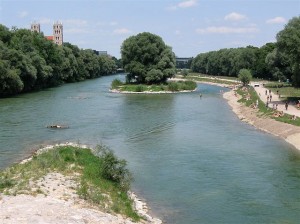
“Isar an der Wittelsbacher Bruecke Muenchen-4” by Rufus46 – Own work. Licensed under CC BY-SA 3.0 via Wikimedia Commons-
Bike-riding,barbecues,sunbathing and swimming (nudism allowed in certain areas) are all enjoyed along the shoreline of this beautiful river. The river Isar begins it journey from the Alpine region of Tirol in Austria, enters Germany near Mittenwald and travels on through Munich, eventually flowing into the Danube near the town of Deggendorf.
Back to inner city sightseeing. Weather fine for a couple of hours now, looking forward to seeing the New Town Hall a magnificent Gothic building in Marienplatz. Others on the tour have a special Bavarian dinner to go to tonight. Still daylight so opted to miss dinner and explore Marienplatz and the New Town Hall. The bus tour driver dropped us near the National Theater of Munich and arranged to pick us up in a couple of hours.
The National Theatre in Munich is the home of the Bavarian State Opera and the Bayerisches Staatsballet (Ballet) in Max-Joseph-Platz, only 6-7 minutes walk to Marienplatz. Many works of the famous composer Richard Wagner (much admired by King Ludwig II) premiered in the National Theater during the years 1865-1888. I had hoped to have a look inside the opera theater as pics look very luxuriant, however it wasn’t open.
Related Posts:
- Romantic Road – Nymphenburg Palace – Munich
- Ettal Abbey and Pilgrimage Church
- Garmisch-partenkirchen ski resort – Oberammergau village
- Extravaganza – Schloss Linderhof | King Ludwig
- Hohenschwangau Neuschwanstein Schwangau
- Beautiful Schloss Neuschwanstein
- Abbey of St Mang’s Fussen Bavarian Alps
- Beautiful rococo Wieskirche beautiful Bavarian alps
- Augsburg Fuggerei village settlement
- Dinkelsbuhl medieval fortifications-medieval city wall
- Rothenburg – a beautiful medieval town
- Romantic Road attractions Germany
- Romantic Road Frankfurt Germany
- Bavaria Germany Wurzburg – along the Romantic Road
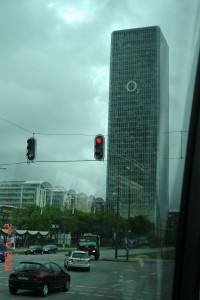
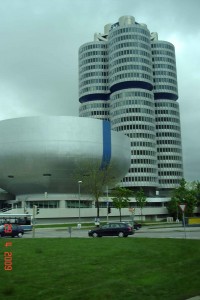
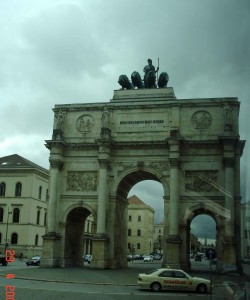
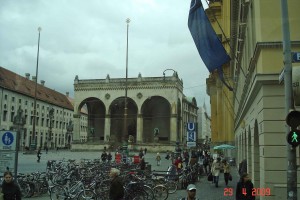
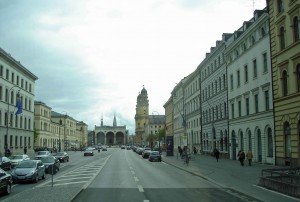
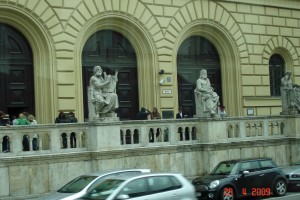
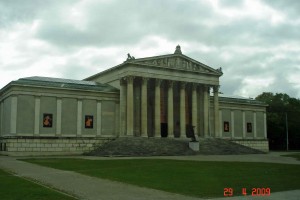
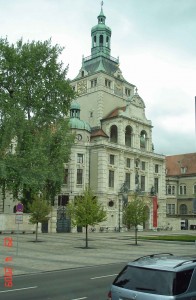
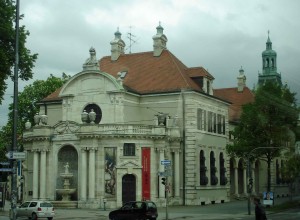
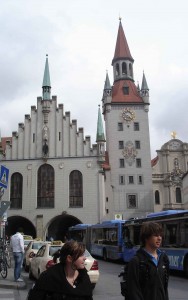
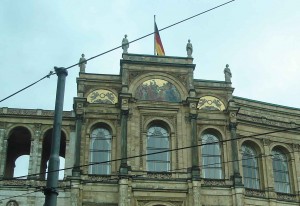
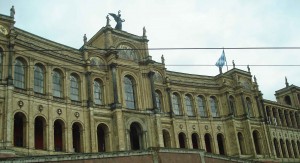
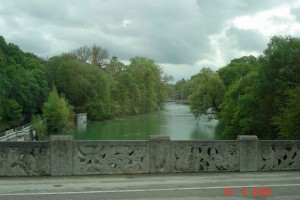
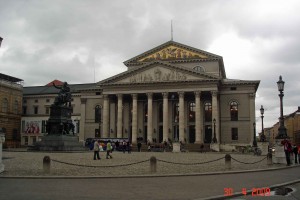
Really Germnay contains beautiful sightseeing, and historical monuments. Thanks Mme Lyn you give to your readers a lot of useful information about countries’s culture.
Hi Karmela, Pleased you found the post interesting. The tour along the romantic road through Bavaria has been so interesting in learning about the history,culture, seeing the palaces and picturesque countryside of Germany.Everything in Europe has such a long history. Thanks for your comment.
Lyn, There certainly is a lot to do in Bavaria…I really want to go to the BMW museum.
Hi Corinne,If your into BMW’s your would find the Museum most interesting. Thanks for your comment. Lyn